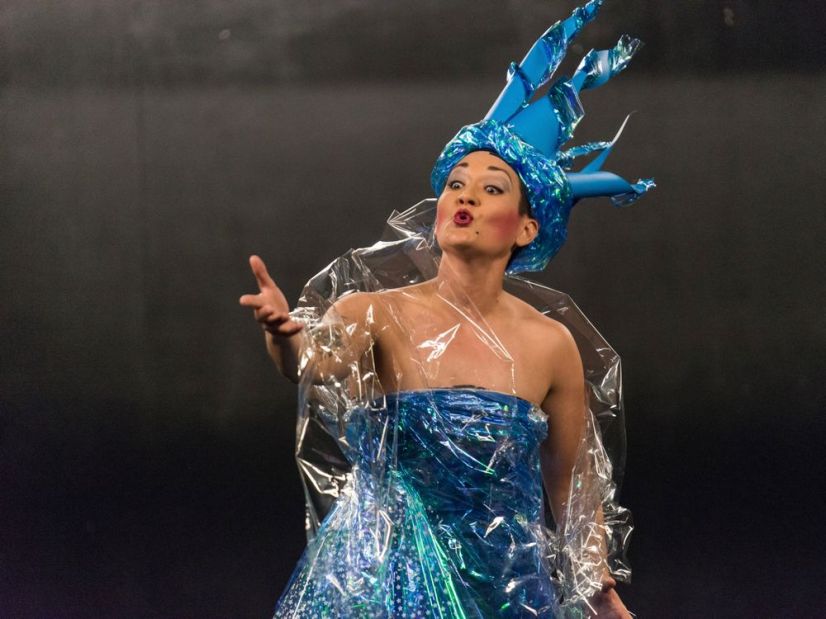Posted in the Vancouver Sun June 12, 2019
Queer Arts Festival highlight delivered by Abbotsford-raised classical singer.
Queer Arts Festival
When: June 17-28
Where: The Roundhouse Arts Centre
Tickets and info: queerartsfestival.com
Opera singer Teiya Kasahara has a special connection to The Magic Flute.
The 1975 Ingmar Bergman film version of the 18th-century Wolfgang Amadeus Mozart masterpiece was the first time a-then-12-year-old Kasahara saw opera. Two decades later that same opera became the inspiration for the one-person show The Queen in Me that Kasahara will perform June 21-22 as part of Vancouver’s Queer Arts Festival (QAF) at the Roundhouse Arts Centre, June 17-28.
Kasahara, who identifies as gender queer and uses the them/they pronoun, experienced that operatic eye-opening via a summer singing workshop at the UBC Summer Music Institute.
“I was blown away. I had never seen opera before,” said Kasahara, who grew up in Abbotsford. “I was amazed what the human voice could do in combination with an orchestra. To see the sets and the lighting and how it was filmed — I was, ‘Wow.’ Even though it was in Swedish it just blew me away.”

After giving up on a career as a rock singer — the rest of her friends weren’t as “committed” — Kasahara decided on opera and went on to earn a Bachelor of Music in Opera Performance degree from the University of B.C.
Then, at 22, Kasahara moved to Toronto and worked with among others the Canadian Opera Company.
But while Kasahara took to stage after stage to sing classic opera, the singer felt increasingly aware of the sexist confines in which the sopranos exist in classic opera. Think about it: the usual script is the soprano sings beautifully about unrequited love, forbidden love, finding love, losing love and then they usually die (methods vary from madness to execution).
Flash-forward to 2016 and Kasahara, 34, had played the Queen of the Night from The Magic Flute eight times and increasingly she felt the character of the famous fallen woman was lacking in complexity, something Kasahara saw as an issue for soprano characters throughout opera.
In a bid to embolden the sopranos, Kasahara took the Queen of the Night out of The Magic Flute and gave her a backstory and a voice outside of the famous arias. Using music from Mozart and other famous pieces, as well as the spoken word, Kasahara dug into her own experiences as a biracial, queer, feminist and created The Queen in Me, a cheeky look at gender, race and opera’s love of an over-the-top trope.
“I extract her from this opera and take her out of this make-believe world and I stop the opera and I’m giving her a platform to speak to finally voice her story, which she never gets the opportunity to do in the opera itself,” said Kasahara, who is joined in the show by pianist Rachel Iwaasa. “She kind of unpacks the really sexist and misogynistic way in which we represent females, female characters through opera and on the stage, and how we still perpetuate that today you know by putting on these old operas.”
Kasahara sees the Andrea Donaldson-directed The Queen in Me as just one step toward reforming the rigid opera form and opening the curtains to a less-constrained and narrow world.
“To maybe somehow see opera that isn’t so bound by voice types and sex and or gender. We could be a bit more flexible with wanting to create stories that allow for that flexibility and range and be able to hire artists because of their artistry and not because you need a tenor or a baritone or I need this person to be taller than this person. You know that kind of thing — to be less rigid in casting. To be less rigid in how we are composing and creating these operas. That would be really cool to see that. That is down the road but I think in the meantime we can see a lot of re-imagination of the works in the cannon right now. (We can) be more playful with that and not hold all these works on a pedestal so much.
“Why not break them open and use the technology we have? Why not electronic instruments? Why not an electric guitar? Mozart was a rocker I kid you not,” added Kasahara. “You hear is stuff and you think that would be so cool to hear that on an electric guitar.”
Using opera to take a stand about opera may seem kind of like inside ball, but when you look at the history of opera it began as and has always had a whiff of the underdog, looking for change.
“Opera has been a place where composers, poets and librettist writers have used this medium to comment on what’s going on in their culture in that time period. People have been censored by governments and monarchies. People have lived and died for this work, for opera,” said Kasahara. “I think it is what we are lacking now. We’ve become so complacent with it being this elite art form. It was initially made for the people by the people, then it was kind of taken over by these monarchies and controlled and censored. But no, music is for all and music connects for all. If we can do that with different stories like opera, which is music and words together then why not? It’s a great art form that I love to do. It makes me feel whole singing this kind of music in this capacity and making it even truer by creating my own works like The Queen in Me and talking about the issues that we were just happy to hush away.”
For QAF artistic director SD Holman The Queen in Me is a “perfect fit,” for this year’s theme of rEvolution. The festival will be showcasing 100-plus artists and 20 different events.

“The evolution of the revolution. We have big anniversaries this year, right? We have the Stonewall anniversary, which is the launch of prides around the world. Then of course the omnibus that also happened 50 years ago, which was a partial decriminalization of sodomy. So talking about that. Revolution is not just a one-time thing so looking at that and what hasn’t changed. So we wanted to recognize that and work with that,” Holman said.
The 11-day festival offers a wide variety of performances and events, but sitting squarely at its heart is the annual curated art exhibition. The Relational rEvolutions show is guest-curated by Elwood Jimmy, Thunderchild First Nation from Saskatchewan artist, educator, curator and gardener.
“It is a wide variety of work that I am hoping that when people walk through they will make some connection between the work,” said Jimmy about the show that highlights work from artists across Canada. “(I’m) asking within this exhibition: ‘How do we create and generate environments and relationships that can withstand conflict and withstand crisis and withstand things like scarcity or climate change?’ ”
Jimmy, who identifies as queer male, says festivals like the QAF are paramount for queer artists.
“I think it is important to create and cultivate spaces where everybody can feel safe,” said Jimmy. “I’ve been doing this work for a half a lifetime now and you can see very tangible shifts in terms of spaces opening up and I think sometimes we might tend to think, ‘OK, we’ve done the work now we can relax a bit and kind of step back,’ but I think it is always important to be very rigorous about the work that comes after we have cultivated the space. To maintain them.”
Posted in the Vancouver Sun June 12, 2019

